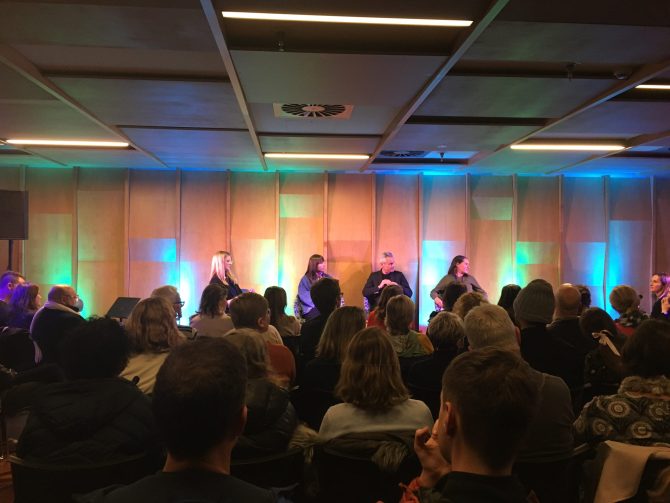The Chamber, a smaller, lower-ceilinged room at The Piano, was packed on Sunday evening. Runners and the running-curious gathered to hear from writers (and runners) Josie Shapiro, Guyon Espiner and Jessica Howland Kany in conversation with Alex Casey from The Spinoff. Josie Shapiro recently published the novel "Everything is Beautiful and Everything Hurts", the story of shy, awkward Mickey Bloom.
Everything Is Beautiful and Everything Hurts
Jessica Howland Kany also recently published her debut novel, "A Runners Guide to Rakiura" in which a millennial New Yorker finds her way to Rakiura (Stewart Island).
Guyon Espiner's book "The Drinking Game" delves into the way in which New Zealand's drinking culture is influenced by government, media and big business. Espiner is a lifelong runner.
Alex Casey began the session by inviting each of the authors to share a reading from their books, and once finished, there were murmurs of recognition and appreciation through the room - for those that love to run, to hear the feelings, sensations and movement of the activity rendered so affectingly in writing is an energising delight. Conversation flowed on, post-readings, with lots of interesting and insightful moments - see below!
Toxic, stealthy presences - and running
After the readings, Alex asked Josie about the difficulties of running as a woman, and the sexism and misogyny women runners face in their pursuit of the sport. For Josie, the experience of being in a female body and facing down the predatory male gaze is a dark reality she needed to reflect in her book. Jessica talked about some of her own experiences as a woman runner - the safety afforded by the isolation and lack of other people on Rakiura, as well as the same by the masses of people in NYC. It was in other places - smaller cities, quiet parks, back streets, where she found she needed to trust her intuition about a place, and if it felt creepy, to avoid it. Segueing to Guyon and the "stealthy toxic presence" of alcohol, the deep entrenchment of the alcohol industry in sport was discussed.
Writing, running, researching
When researching for her book, Josie found that while certain figures of New Zealand's running history are famed, others, like Alison Roe, aren't so well known, and she loved discovering their stories. Some of her favourite research was involved spending four nights on Waiheke watching Olympic Marathons. Guyon mentioned his affinity for Haruki Murakami and his running memoir "What I Talk About When I Talk About Running", which Jessica echoed.
What I Talk About When I Talk About Running
Running and taboo-breaking
The body and its functions come to the fore as a runner, and Alex asked about running and menstruation - mentioning the novel Alex, by Tessa Duder, which was scandalising to some on publication with its frank portrayal of a changing female body. For Josie, this is another reality of the experience of being in a female body, and of being an athlete, that needed representation. In a slick segue, Alex then asked Guyon about "running the gauntlet" of another taboo of sorts - socialising in New Zealand without alcohol. He described a kind of reversal of the burden of proof - no-one ever asks why you're drinking, but if you aren't, they want to know your reason. He found navigating these pressures the first and most difficult thing after quitting alcohol.
Gadgets, songs, silly little runs
Many runners love to adopt an array of gadgets and tech to support their running, though on a basic level it really is one of the simplest sports, gear-wise. Jessica shared her favourite running gadget, and it sounded very cool, and very functional - a "shoe pocket" from the early 90s, which she attached to her trainer and could use to hold a key and some cash for a pretzel. Running songs as augmentation device for runners were also explored - Jessica loves Writing to Reach You by Travis, Josie doesn't run to music but loves writing to film scores, and Guyon also mostly runs music-free, but occasionally deploys music strategically - a reward for the last 17km of a marathon, something to look forward to when things get hard. The "silly little runs" of the pandemic were recalled, with zero nostalgia on Guyon's part, who prefers a journey-style run rather than endless repetitions circling a park of block. Jessica, on the other hand, was down on Rakiura for the lockdowns, a dream running destination.
Is it time to run?
Alex then talked about how running seems like the perfect pastime for right now, referencing Jenny Odell's "How to Do Nothing: Resisting the Attention Economy".
As so much competes for our mental energy, time, resources, maybe running can serve as a salve and escape. Alex asked the three if now's the time to pick it up as a sport. Predictably, they all agreed - and the benefits of movement for the body, in any way, not just running, were lauded, as was as the exploratory, exciting quality of running as a means of seeing places, both new and anew.
I left feeling energised, ready to lace up my trail shoes and hit the hills. If you feel similarly moved, there's lots of useful books and videos in our library collections to fuel you.
Find out more
- WORD Christchurch website and 2023 programme
- Our WORD Christchurch 2023 page
- Follow @WORDChCh on Twitter
- Follow WORDchch on Instagram
- Like WORD Christchurch on Facebook
- Listen to WORD Christchurch podcasts





Add a comment to: WORD Christchurch 2023: Run For Your Life